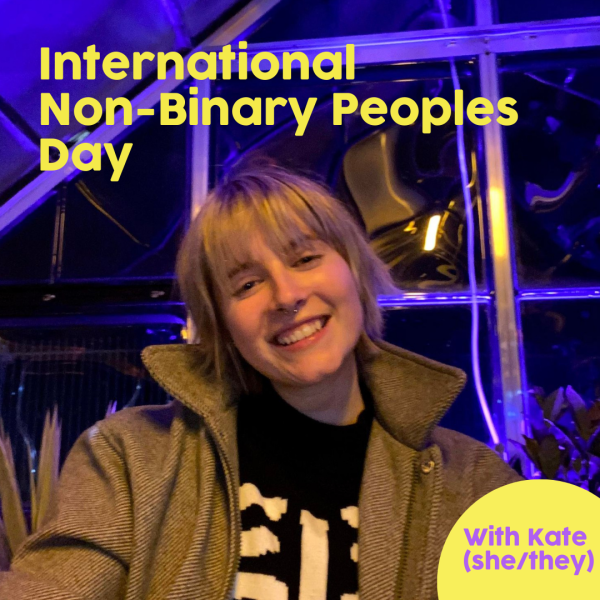International Non-Binary People's Day with Kate
14 July is International Non-Binary Peoples Day! We celebrate those who are non-binary, the rich diversity of gender and celebrate people who do not fit into a binary gender.
A non-binary person is someone who does not identify exclusively as male or female. Someone who is non-binary might feel like a mix of genders, or like they have no gender at all.
Kate (she/they) from the headspace Hawthorn & headspace Malvern Youth Advisory Group shares their experiences as a non-binary person. Check out what they had to say below!
What would you say to someone who is questioning their gender and/or sexuality?
"I’d say that questioning your identity isn’t something scary or wrong, and is in fact, normal. I’d encourage people to question their sexuality or gender. There’s nothing wrong with trying different labels or ways of expressing yourself, whether that's through clothing or makeup, for example.
Giving yourself space and time to try out different versions of yourself and trying different labels is one of the best ways to discover what feels the most you in your self expression and identity. So, I’d say go for it - try out as many versions of yourself that feel comfortable and finds what feels right and know that it's ok to try on labels that end up feeling wrong. You don’t have to commit to anything."
What is your favourite thing about being non-binary?
"Freedom to explore myself and my gender without feeling like I need to live up to any gendered expectations."
What is a common misconception about what it means to be non-binary?
"That on face value we’ll appear androgynous (a mix of both male and female characteristics) and we all use they/them pronouns or potentially, neo-pronouns. Often non-binary people are associated with an image of a slim, white person who is the perfect blend of man and woman - someone who is ambiguous. This removes people of colour, people living with a disability and others from being perceived and accepted as part of the non-binary community.
Non-binarism can look so vastly different and you can’t assume that anyone you look at doesn’t identify as non-binary. Non-binary is such a large category which basically refers to anything outside man and woman. Gender is so nuanced and varies an infinite amount.
Someone who is non-binary may appear to be a cisgender or transgender woman/man to you, but in reality this may not be how they identify. I myself am often viewed as a woman. The same goes for pronouns - just because someone uses he/him or she/her pronouns doesn’t mean they aren’t non-binary, they just may not identify with they/them or neo-pronouns."
What has your experience been like as a non-binary person?
"Its been hard. I’ve experienced a lot of imposter syndrome in that I’ve felt that I’m not “non-binary enough” because I was assigned female at birth and identify with many of my feminine qualities. Over the years, I’ve come to terms with the fact that non-binarism is so broad and I don’t have to change myself to fit into any ideal of non-binarism that’s in the media and online spaces. I can just be me and that’s more than enough for me to fit into the community.
It’s hard being perceived as a woman pretty much everyday of my life as well. But, I have so much privilege in being able to express myself the way I want to and there’s so much joy in that. It’s also super fun to keep constantly exploring my non-binarism. I find my gender identity changes a lot - some days I identify more with femininity and other days I identify with androgyny. So, everyday is a discovery of how I feel that day and what clothes and makeup will express that to the world."
What are some things that people can do to be a good ally for the non-binary community?
"Stop assuming people’s genders. Ask for pronouns or offer your pronouns first when meeting people. Also put your pronouns in your social media profiles; this helps normalise seeing pronouns online. Use more gender neutral terms where possible (i.e. folks instead of ladies and gentlemen).
Do your research! Take time to learn and understand what terms mean or what’s happening in the trans and non-binary community (e.g. our rights, issues in the community etc.) Above all, being respectful is the most important thing you can be towards to a non-binary person or LGBTQIA+ person, or any person. You don’t have to understand me or my gender, to be respectful of me."
